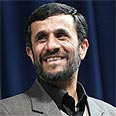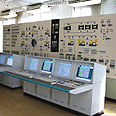

Iranian President Mahmoud Ahmadinejad said Wednesday night that his country will not back away from its right to enrich uranium and will ignore renewed international calls to halt sensitive nuclear work.
"Our answer to those who are angry about Iran obtaining the full nuclear cycle is one phrase, we say: Be angry and die of this anger," Ahmadinejad said in comments reported by the official IRNA news agency.
"We will not hold talks with anyone about the Iranian nation's right (to enrichment) and no one has the right to step back, even one iota," he said in remarks made shortly before the arrival early on Thursday of the U.N. nuclear watchdog chief, Mohamed ElBaradei, to discuss Iran's nuclear program.
ElBaradei said he would urge Iran to halt its enrichment activities in line with demands by the U.N. Security Council and the International Atomic Energy Agency (IAEA).
We hope to convince Iran to take confidence-building measures including suspension of uranium enrichment activities until outstanding issues are clarified," ElBaradei told journalists at the airport.
"I would like to see Iran has come to terms with the request of the international community," he added.
The Iranian president said: "Today, our situation has changed and we are a nuclear country and we are talking to others from that position."
The president said on Tuesday that Iran had successfully enriched uranium to a level used in nuclear power stations for the first time and planned to press ahead with industrial-scale production, drawing condemnation from world powers.
France: Military strike against Iran 'not topical'
The international community united in condemning the move although differences remain over what should happen next, with Washington demanding "strong steps" from the UN Security Council and Russia warning against the use of force.
Representatives of the five permanent members of the Council plus Germany are to meet in Moscow next Tuesday to discuss the crisis, China's UN envoy said.
ElBaradei said that despite the escalation in tensions he hoped the nuclear crisis still could be resolved through political dialogue.
"I am hopeful the time is right for political solutions, through negotiations. I hope conditions will be created for all parties to return to talks," he said.
ElBaradei must give a report at the end of April on Iran's nuclear activities to the UN Security Council and the 35 states of the IAEA's governing council.
Meanwhile, French Foreign Minister Philippe Douste-Blazy on Thursday dismissed talk of the possibility of military strikes against Iran over its nuclear program.
"This is absolutely not topical," he said in an interview with RTL radio when asked about the likelihood of military strikes. "We have always been in favor of a negotiated solution."
A Chinese ministry spokesman said Thursday that China will send a top envoy on arms control to Iran and Russia in an effort to defuse the Iran nuclear standoff with the West, urging restraint on all sides.
Assistant Foreign Minister Cui Tiankai would visit Iran and Russia from April 14 to 18, spokesman Liu Jianchao told a regular news conference.
"We hope the relevant parties can exercise restraint and not take measures that will escalate the situation," Liu said.















